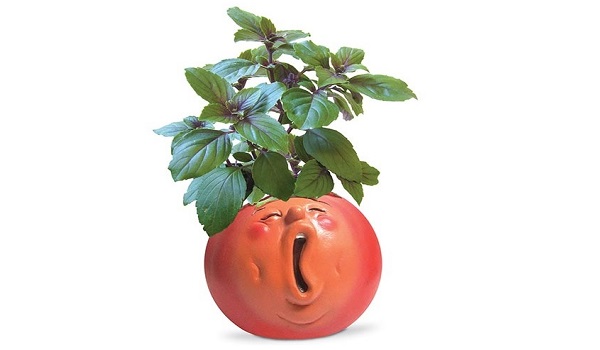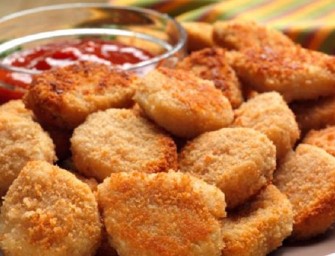Main Name: Basil
Biological Name: Ocimum basilicum
Names in other languages: Albahaca (Spanish), Basilic (French), Tulsi (Hindi), Tirunirrippachai, Tiviragandam, Thulasi (Tamil), Pachcha, Sivatulasi (Malayalam), Oddhi, Rudrajada, Tulsi-chettu (Telugu), Sabje (Gujarati), Babui tulsi, Kalotulsi (Bengali), Sabja, Tulasa (Marathi), Dhalatulasi (Oriya), Tulsi (Urdu & Punjabi)
Biological Name: Ocimum basilicum
Names in other languages: Albahaca (Spanish), Basilic (French), Tulsi (Hindi), Tirunirrippachai, Tiviragandam, Thulasi (Tamil), Pachcha, Sivatulasi (Malayalam), Oddhi, Rudrajada, Tulsi-chettu (Telugu), Sabje (Gujarati), Babui tulsi, Kalotulsi (Bengali), Sabja, Tulasa (Marathi), Dhalatulasi (Oriya), Tulsi (Urdu & Punjabi)
Regarded as the king of herbs, basil is revered as “holy herb” in most of the traditions across the globe. It is worshipped to be a sacred symbol in the Hindu religious traditions in India and worldwide. Apart from its religious significance, basil is one of the most common herbs used as a flavoring agent in various cuisines throughout the world. So, whether they are sauces, soups or salads, basil provides fragrance and flavor, thereby enhancing the entire appeal of any delicacy. Although the plant is native to India, Iran, and other tropical regions of Asia, it has been derived from the Greek word ‘basileus’ which means ‘king’. Coming from the peppermint family, basil appears similar to this plant due to its round leaves. Generally green in color, basil leaves can have hues of red or purple, though all of them give off a strong, warm, and yet a fresh flavor. Basil has more than 60 different varieties to its credit, with each one offering a similar taste, but the difference being in its appearance. The sweet basil exudes a pungent taste, while the other varieties carry distinct flavors, namely, lemon basil, anise basil, and cinnamon basil. As a nutritional herb, basil provides us with several significant nutritional substances essential for our overall well being. Take a look at the plethora of important healthy benefits that basil offers in the sections below.
History
Considered to be a native of India and Iran, records indicate that basil could be an origination of the Far East. However, ancient records from 907 AD reveal that sweet basil existed in the Hunan region of China, while in India, it enjoyed great reverence amongst the royals and was regarded as a sacred herb in native India. But the first written record of basil dates back 4,000 years ago, when it was cultivated in Egypt. Even the name basil comes from the Latin form of the Greek word for ‘King’ or ‘Kingly’. But basil did not enjoy much recognition in ancient Greece and Rome, and was moreover linked with poverty, hatred and misfortune. On the other hand, basil was regarded as a symbol of love in Italy. Basil was introduced in Britain only in the 16th century who took it further to North America in the 17th century. Beginning from the Massachusetts Bay Colony, basil cultivation was spread to other colonies. Today, basil is the most recognized herb in Italian, Thai, Vietnamese and Mediterranean cooking.
Considered to be a native of India and Iran, records indicate that basil could be an origination of the Far East. However, ancient records from 907 AD reveal that sweet basil existed in the Hunan region of China, while in India, it enjoyed great reverence amongst the royals and was regarded as a sacred herb in native India. But the first written record of basil dates back 4,000 years ago, when it was cultivated in Egypt. Even the name basil comes from the Latin form of the Greek word for ‘King’ or ‘Kingly’. But basil did not enjoy much recognition in ancient Greece and Rome, and was moreover linked with poverty, hatred and misfortune. On the other hand, basil was regarded as a symbol of love in Italy. Basil was introduced in Britain only in the 16th century who took it further to North America in the 17th century. Beginning from the Massachusetts Bay Colony, basil cultivation was spread to other colonies. Today, basil is the most recognized herb in Italian, Thai, Vietnamese and Mediterranean cooking.

http://livingawareness.com/health-benefits-basil/
Health Benefits of Basil
- With high levels of beta-carotene, vitamin A, cryptoxanthin, lutein and zeaxanthin in basil, these compounds act as protective scavengers against oxygen-derived free radicals and reactive oxygen species (ROS), thereby preventing premature aging and various diseases.
- Foods rich in zeaxanthin, a yellow flavonoid carotenoid compound, help in filtering harmful UV rays by reaching the retina, thereby protecting against age related macular degeneration (ARMD), particularly in elderly people. Basil contains exceptionally high amounts of zeaxanthin.
- Vitamin A is essential for good vision due to its antioxidant properties. Besides, it is also necessary for maintaining a healthy mucus membrane and skin. Basil, being a good source of vitamin A, promotes better eye vision and fights against cancers of lung and oral cavity.
- Basil contains significant amounts of vitamin K which play an important role in strengthening bones and assisting the mineralization process of the bones.
- Potassium, manganese, copper and magnesium are vital for the proper functioning of the body. While potassium is required for controlling heart rate and blood pressure, manganese is important for the antioxidant enzyme superoxide dismutase. Basil has all these compounds in good quantities and hence, should form a part of a healthy diet.
- Basil is a good source of volatile oils, like eugenol, cineole, estragole, limonene, linalool, myrcene, sabinene and others, which have strong anti-bacterial properties. These oils combine to fight against many bacterial infections, such as enterococcus, staphylococcus, and so on
- With anti-inflammatory effects, basil is recommended to people suffering from arthritis. Basil oil, in particular, contains eugenol, a substance that blocks the activity of an enzyme in the body called cyclooxygenase which causes swelling.
- Magnesium, present in considerable quantity in basil, relaxes the muscles and blood vessels, thereby improving blood flow and reducing the risk of irregular heart rhythm of heart muscles and blood vessels.
- Basil essential oil makes a great skin and hair moisturizer, as it enhances the luster and shine of dull looking skin and hair.
- Basil is widely used for curing skin problems, such as acne and psoriasis.
- Constipation, stomach cramps, indigestion and flatulence can be treated by consuming basil tea. As such, it provides immediate relief from gas in the stomach and intestines.
- The essential oil acts as an anti-vomiting agent in motion sickness and various other vomiting cases. Besides, it is highly recommended in effectively curing cold, influenza, whooping cough, asthma, bronchitis and sinus infections.
- For treating stress-related problems like migraines and depression, basil oil finds a significant place in aromatherapy due to its calming effects and promotion of mental strength and clarity.
- Basil, when consumed in the form of herbal tea, helps in alleviating the symptoms of urinary infections, colics, anorexia, gastric ulcers and diarrhea.
- Basil is widely used in ayurvedic medicines for curing a variety of common ailments, such as diabetes, respiratory disorders, impotence, allergies, and infertility.
- With a powerful compound called cinnamanic acid present, basil has been proved to stimulate circulation, stabilize blood sugar and improve respiration.
- Effective treatment of skin rashes, eczema, wounds and insect bites constitute other valuable health benefits of basil.
Basil Nutrition FactsAmount: 1 cup
Total Weight: 42 g
Total Weight: 42 g
| Nutrients | Amount |
| Basic Components | |
| Protein | 1.3 g |
| Water | 38.7 g |
| Ash | 0.6 g |
| Calories | |
| Total Calories | 9.8 |
| Calories From Carbohydrate | 4 |
| Calories From Fat | 2.3 |
| Calories From Protein | 3.3 |
| Carbohydrates | |
| Total Carbohydrates | 1.1 g |
| Dietary Fiber | 678 mg |
| Sugar | 127 mg |
| Fats & Fatty Acids | |
| Total Fat | 271 mg |
| Saturated Fat | 17 mg |
| Monounsaturated Fat | 37 mg |
| Polyunsaturated Fat | 165 mg |
| Omega-3 Fatty Acids | 134 mg |
| Omega-6 Fatty Acids | 31 mg |
| Vitamins | |
| Vitamin A | 2237 IU |
| Vitamin C | 7.6 mg |
| Vitamin E | 339 mcg |
| Vitamin K | 176 mcg |
| Thiamin | 14 mcg |
| Riboflavin | 32 mcg |
| Niacin | 382 mcg |
| Vitamin B6 | 66 mcg |
| Folate | 29 mcg |
| Pantothenic Acid | 89 mcg |
| Choline | 4.8 mg |
| Betaine | 0.17 mg |
| Minerals | |
| Calcium | 75 mg |
| Iron | 1.3 mg |
| Magnesium | 27 mg |
| Phosphorus | 24 mg |
| Potassium | 125 mg |
| Sodium | 1.7 mg |
| Zinc | 343 mcg |
| Copper | 163 mcg |
| Manganese | 487 mcg |
| Selenium | 0.13 mcg |
How many calories in basil (per 100 gm)
Basil has about 23 calories per 100 gm of weight.
Basil has about 23 calories per 100 gm of weight.

http://inclusions.org/marks-basil-pesto-recipe/
How to Buy Basil
- For the best flavor and fragrance, pluck basil leaves before the plant starts flowering. For this, you can grow basil indoors all year round.
- In case you do not have the luxury of a basil plant at your home, you can find fresh basil leaves in the market. Always look for whole, smooth leaves that are bright green, free from black spots, and exude fresh aroma.
- Avoid basil leaves that have moldy stems, show signs of wilting or decay, or have dark spots.
- Basil is available in dried form also. Hence, always explore the market to pick up dried basil which is of superior quality and freshness. Select organically grown basil for the best aromas and taste, as they will not be irradiated and will have the right vitamin C and carotenoid content.
Basil Storage Tips
- While storing fresh basil leaves, refrigerate in airtight containers to retain their freshness and fragrance. Wrap them in a slightly damp paper towel, or place them in a glass of water and cover it with a plastic bag. Make sure that you change the water daily and use the basil leaves within a week.
- Although basil keeps well for two to four days, it is advised to use the leaves as soon as possible, just like other fresh herbs.
- Fresh basil makes a great option for freezing, whether whole or chopped. Simply blanch the whole basil leaves for two seconds, plunge into ice water, pat dry, and transfer into an airtight container in the freezer. Do not thaw before using, for a stronger flavor.
- Alternatively, you can place whole or chopped basil leaves in ice cube trays and cover them with water or broth. Place them in the freezer and pop out the cubes into an airtight bag. Use the cubes as required, in soups, stews or sauces.
- Store dried basil in a tightly sealed glass container in a cool, dark, and dry place where it will last for up to six months.



